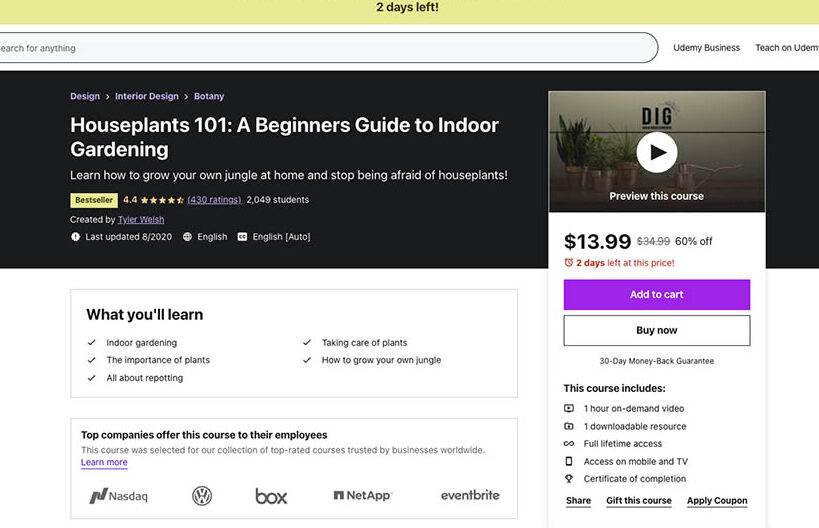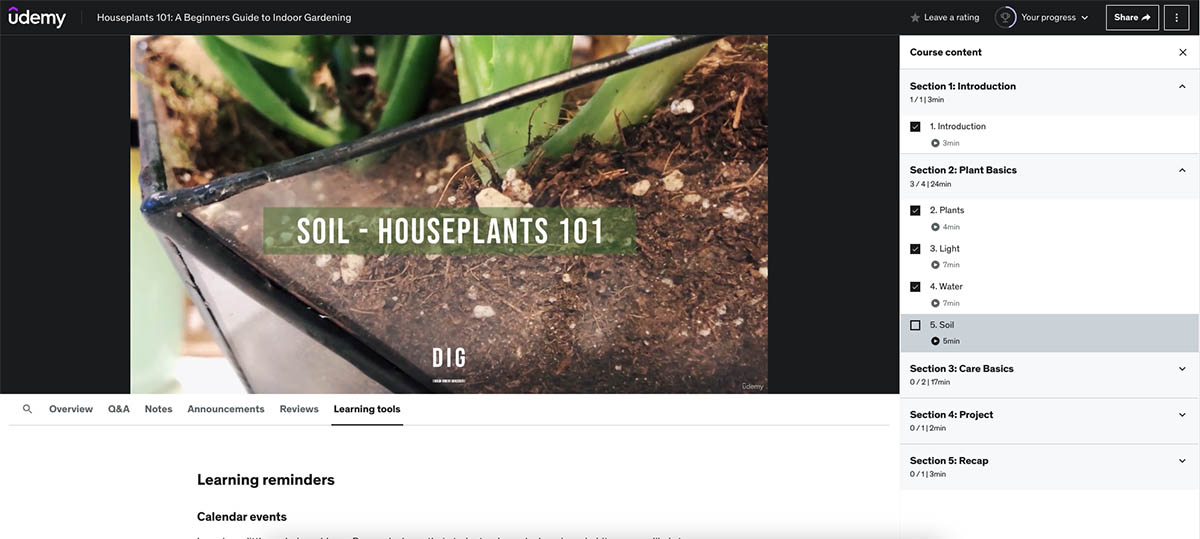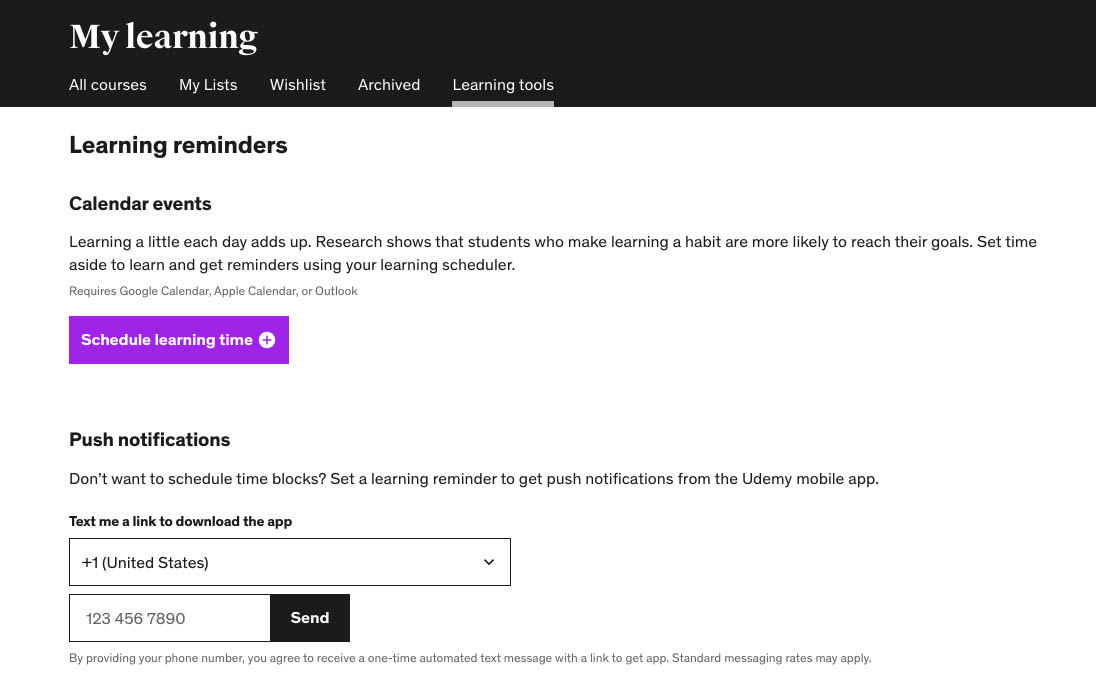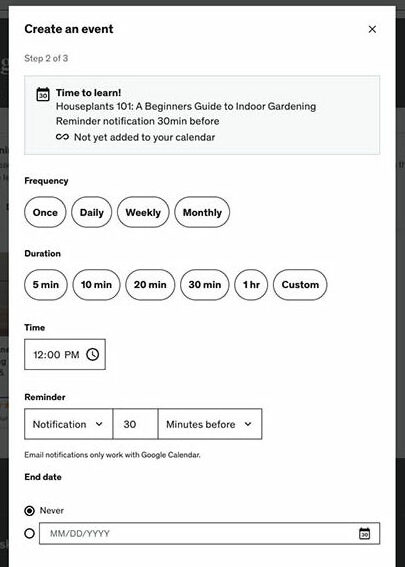We may earn revenue from the products available on this page and participate in affiliate programs. Learn More ›
These days, there is a class for just about anything online. Whether seeking a software tutorial or instructions on starting a new craft, students likely won’t need to look further than the nearest computer or smartphone. Udemy is one of dozens of platforms available offering virtual classes to lifelong learners. With a library of thousands of courses ranging in topic from graphic design to magic tricks, Udemy has proven itself to be an increasingly popular choice since its launch in 2010. It operates on a unique model where any subject matter expert can record their own course and share it on the site’s marketplace.
To review Udemy, I used the platform exclusively as a student (logistically, reviewing it as a teacher wasn’t possible—I had no class to offer). With so many sites to choose from, potential students may reasonably be wondering, “Is Udemy legit?” when deciding which one is right for them. The answer is that it depends strictly on one’s needs. Ultimately, hobby students looking for in-depth knowledge on just about anything can benefit in some way. Read on for a full Udemy.com review.
Love UDemy? See more of the best online interior design courses, best online plumbing courses, and the best online floral design classes.
At A Glance
Udemy
Specs
- Pricing: Free, $19.99 to $199.99 per course, or $20 per month for Udemy Personal
- Skill levels: All levels
- Class length: 0 to 17+ hours
- Accreditation: No
- Money-back guarantee: 30 days for single-class purchases
Pros
- Students can tailor learning to their needs and interests
- Udemy Personal subscription provides access to all courses at no additional cost
- Reviews and ratings for each course are displayed on the course page
Cons
- Lack of consistency in class quality
- Money-back guarantee not included with Udemy Personal subscription
- No guidance or feedback from tutors or instructors
- No accreditation or certification for students
Our Verdict: Udemy describes itself as a “global destination for online learning,” and with relatively affordable content in dozens of languages, it is widely accessible. Students will find courses to match just about any budget, schedule, and level of expertise. While Udemy is not accredited by any universities, and classes will not count toward a degree, the courses may help hobby students gain a better understanding of topics in a professional or academic setting.
Udemy Review: Claims
Before using or hiring any service, it’s important to be sure that it lives up to its claims. Taking an online class is no different, so it’s worth asking, “Is Udemy good?” Udemy’s stated purpose is to help students all over the world take their learning into their own hands by providing an affordable, easy-to-use virtual learning platform. But how does it actually stack up when put to the test?
Course Selection
Udemy boasts one of the largest marketplaces of its kind with over 185,000 courses in 75 languages. It has achieved this massive database by allowing experts and instructors all over the world to publish their own courses on the site. The result is a diverse and wide-ranging collection of content that covers all manner of interests. While the home page mostly promotes courses on professional skills such as web development or leadership, clicking into any of the “Top Categories” reveals the full extent of Udemy’s library. Within broad categories like Business and Lifestyle are hundreds of titles that get as specific as “Cat Behavior” or “How to Sell Real Estate on Instagram.” Potential students can refine their search by ratings, duration, topic, subcategory, language, price, features, and subtitles, and the most popular classes are promoted front and center. Most of the content offered by Udemy tends to be geared toward learners without prior experience in the subject, although some topics have a handful of intermediate or expert-level selections.
Pricing and Money-Back Guarantee
Individual course prices on Udemy range from $19.99 at the lowest up to $199.99 for the most expensive, with a few being offered for free (although users are encouraged to note that prices change all the time). The site runs promotions and discounts frequently, and instructors often have limited-time offers on their individual courses. An important factor to keep in mind is that while Udemy makes recommendations to its instructors on fair pricing, ultimately each course instructor sets his or her own price. If a course does not live up to a student’s expectations for any reason, Udemy offers a money-back guarantee that is good for 30 days after purchase (otherwise it may issue the refund in Udemy credit).
Students taking more than one course on Udemy may want to opt for the $20 monthly subscription, or “Personal Plan.” The Personal Plan doesn’t include the site’s full content library, but with thousands of courses, there is still a substantial selection to choose from. Subscriptions are exempt from the money-back guarantee but begin with a 7-day free trial for customers to decide if they like the service; if not, they can cancel it for free.
Course Length and Structure
Perhaps excluding those with the busiest of schedules, most users will find that Udemy has a course that matches their availability and commitment level. Some courses will take less than 45 minutes to complete, while the longest courses provide up to 17 hours of instruction. Courses take the form of video segments and may include lectures, demonstrations, or slideshows, depending on the subject matter. As is the case with pricing, course features and structures are completely up to individual instructors. While some instructors may provide quizzes and other supplementals, others might focus their energy on responding to questions in the Q&A section. This information will usually be included in the course description, so students will know what to expect before they buy. It is also possible to sort by length and features while looking through the course options.
Students can take courses at their own pace, so there is no need to complete lectures or assignments within a certain time frame. Progress is saved and tracked, so it’s possible to break up the work into manageable chunks if needed.
Content Access and Features
Udemy provides lifetime access to purchased courses, which makes it possible to refer back to the content indefinitely. All past and current courses are listed under “my learning” along with any archived or wish-listed courses. There is also an option to schedule “learning time” by inputting an intended time and date to work on a class. Udemy then keeps students accountable by adding the class to their calendar and notifying them when it’s time to learn.
For those who purchase a subscription, Udemy offers even more. The Personal Plan provides access to thousands of courses for a monthly fee. Udemy Pro is an IT-specific program that is meant to “help students accomplish their IT certification goals.” For businesses looking to train groups of employees, Udemy Business is a more dynamic and customizable option. Unlike with individual courses, access to classes students have taken only lasts as long as their subscription (regardless of the type of subscription they opt for) is active, and one account is only allowed one subscription at a time.
The Udemy app is also accessible both to subscribers and one-time users. Just as on the site, users can browse all the available classes and watch lectures, plus download classes to learn offline.
Certifications and Accreditation
Udemy is not an accredited institution, and most of its content will not qualify students for college credit or certification unless a program has specified otherwise. With thousands of instructors, it’s impossible for Udemy to verify the credibility of each course. As is true with most online resources, students will need to use their best judgment in deciding whether an instructor meets their requirements and can speak reliably to the topic at hand. For most Udemy courses, the instructors’ bios and credentials will be listed in the course description for reference. It’s also worth it to consider when the course was published and if any of the information could have become outdated since then. Most courses will offer a certificate of completion.
Putting Udemy to the Test
I first turned to Udemy in search of a general class on gardening or caring for plants. Since I am an apartment dweller, all my plants are potted and, admittedly, a little worse for wear. Udemy’s intuitive site made it easy to find the perfect course on the basics of caring specifically for houseplants and to get started learning. The process of assessing my class options, checking out, and using the service was smooth, and after finishing my first course I felt inspired to try many more in the future.
Choosing a Course
Before logging on to Udemy for the first time I had not grasped the sheer volume of course options that the site houses. Searching for “gardening” alone yields over 400 results. At first I was overwhelmed, imagining myself spending an hour combing through courses. However, the filter proved itself useful and I refined my search by rating (at least 4.5 stars), the time I was willing to spend (no more than 3 hours), and level (beginner). Other filters include subcategory, language, price, features, and subtitles. I wish that the “price” filter would have let me sort by either “price low to high” or choose from a few price ranges, but it only gave me the option to choose between paid and free classes.
From there I had a manageable set of results. I opened some potential options in new tabs to assess one by one. Had I already created an account at this point, I could have also saved my top options to my “wish list” for later. If you’ve browsed Udemy’s course catalog and wondered, “Are Udemy courses legit?” the honest answer is that it depends. With so many courses, quality varies somewhat drastically. I found that being able to view several sample videos, a course description, class ratings, an instructor bio, and a breakdown of the course content paints a fairly comprehensive picture of the overall course quality.
I finally settled on Houseplants 101: A Beginners Guide to Indoor Gardening, a 1-hour course taught by Tyler Welsh of Dublin Indoor Gardeners. The relatively high rating of 4.4 stars and “bestseller” label convinced me that I had picked a quality class. It was made up of nine short lectures, all less than 10 minutes long, getting straight down to the basics of plant care (plants, light, water, soil, bugs, care). I noted that the class had subtitles—other courses offered a variety of languages, though this one only included English. There was no mention of learning materials like quizzes or practice tests, but I hadn’t expected them based on the subject matter. What’s more, the class was discounted to $13.99 from its full price of $34.99.

Checking Out
After choosing my class, I was able to check out easily by clicking “Buy Now.” If you have a promo code or want to use Afterpay or Klarna (services that allow users to pay for their purchase in installments), you’d need to navigate to your cart here instead. Some of the more advanced classes on Udemy run pricey, so having the option to break up payments could help mitigate that cost at the time of purchase.
My class was on sale for over half off for just 1 more day, which initially made me feel like I had stumbled on a rare bargain. But after returning to Udemy a few times, I realized that sitewide promotions are pretty much a weekly occurrence. After I was prompted to create an account, the payment process was breezy: I was given the option to pay with a card or with PayPal, and after giving my payment details and clicking “Complete Payment,” I was ready to begin my course.
I was curious about the subscription plans that are offered and found it surprisingly difficult to get information about them. Before creating my account, I saw plenty of links to learn more about Udemy Business or teaching on Udemy. But I did not see any mention of the Personal Plan ($20/month) until viewing my account information and seeing it listed as a subscription option. The elusive “Udemy Pro” plan was not listed with it and is apparently not always open for enrollment.

Taking the Course
To get started, I found my course in the “My Learning” tab in the top-right corner of the site. This is where you can view all courses you have purchased and schedule times when you intend to take them. I imagine this feature is especially helpful if you are taking more than one course at a time. It’s also where you can find classes you’ve added to your wish list.

I clicked on my class and the first lecture began playing. I could track which lesson I was watching and which ones I had left off to the right. Some helpful features underneath the video included a class Q&A, a place to take notes, announcements, reviews, and learning tools. I liked that I could tether my notes to the time stamp of where I was in the lecture and use them later to jump to that part of the video. Under the “reviews” tab I also read what past students had to say about the class (mostly positive, though some wanted more in-depth material). I was able to read these before I purchased the class, but it was interesting to refer back to them once I had experienced it for myself.
The other features were unfortunately irrelevant to my particular class. I had considered dropping a question or two in the Q&A section, but I was disappointed to see that my instructor hadn’t responded to any questions in over a year. This is one issue with Udemy’s open framework—instructors are not required to update their material and could potentially upload a course and never return to it again. This class also did not provide extra tools like quizzes, which would have broken up the lectures nicely and made me feel more like an active participant. Unless the user hits pause, the lectures will play automatically one after the other. I ended up completing my 1-hour course in one sitting since the material blended together so seamlessly.
Otherwise, the lectures were as expected based on the previews. They outlined some basics of plant care, such as optimizing light, water, and soil based on plant types. As a “project,” my instructor demonstrated how to repot plants that are rootbound or have outgrown their current vessels. My plants haven’t yet reached this point, but I fully intend on referring back to this section when the time comes since I have botched this procedure in the past (Fred the Fiddle-Leaf Fig met a premature demise). Lastly, he reiterated the most important points and summed up what we had learned in a recap video. After finishing all the lectures, I received my certificate of completion! I may not get much use out of the certificate out in the real world, but it did make me feel like I’d accomplished something.
Out of curiosity, I also downloaded the app to see if I might prefer the mobile experience. In some ways, it distills the site features more effectively than on the web because the interface is less cluttered. The icons at the bottom of the app allow you to browse featured classes, search the site (with the same filters you get on the web), view “my learning” and your wish list, and view your account info. You can also quickly download courses for watching offline on the app, so you could watch while traveling with no internet service.

Overall, I found using Udemy to be easy, enjoyable, and most importantly, informative. I envision myself both referring back to this course as a refresher and trying out new ones in the future. While I knew what I was looking for this time in terms of classes, I like the opportunity for serendipity you get from simply browsing the catalog. I had never considered learning the art of bonsai before, but after coming across the course on Udemy I’m interested!
UDemy Reviews by Customers
Thousands of students have given Udemy a whirl, and searching for “Udemy courses review” will return a wide spectrum of feedback. Because there are so many courses and instructors to choose from, two users’ experiences on the site can be very different from one another.
Users cite the course variety, easy-to-navigate website, and affordable prices as points in Udemy’s favor. Most reviewers who were pleased with the site mention that they’ve already taken multiple courses and intend to take more in the future.
While most Udemy.com reviews seem to be positive, a few common consumer complaints are worth noting. Some ConsumerAffairs reviews have reported that their refund requests were ignored or rejected by Udemy despite the 30-day money-back guarantee. Representatives were either too slow to respond to the requests or were unhelpful in some cases. A common observation among Trustpilot reviews is how much the quality tends to vary across courses. As mentioned, it is impossible for a site like Udemy to thoroughly vet each and every course, so some variation in quality is to be expected. Individual Udemy course reviews pertaining to specific classes might provide some insight in these cases. Keep others’ Udemy classes reviews in mind, but also take them with a grain of salt since people are more likely to report a negative experience than a positive one.
How Udemy Stacks Up to the Competition
While looking for Udemy course reviews, it is inevitable to come across some of its competitors. Similar sites like Coursera, Skillshare, and MasterClass offer versions of the same service with a few key differences. Udemy stands out for having the largest database compared to its competitors, which comes with pros and cons. MasterClass, for example, might not have the niche subject matter Udemy has, but it does have a lot more control over the quality of its classes and is able to be more curated. Here are a few details on Udemy’s biggest competitors.
Udemy vs. Skillshare
Skillshare is probably the closest relative to Udemy, and both learning communities operate on a similar open framework model where instructors choose to upload courses on their own. Skillshare’s subject matter is more limited to creative skills like design, and its library is smaller. However, classes tend to be more consistent in price and quality and include some higher-profile instructors.
Udemy vs. Coursera
As mentioned above, Udemy is not accredited by any universities. For those continuing a college education or needing a formal certification, Coursera would be the alternative to try. It is partnered with over 170 universities, and students can even earn a degree through its site. However, with that comes a slightly higher price tag, and with Coursera’s main application being for college or career advancement, it isn’t really designed for hobbyists.
Udemy vs. MasterClass
MasterClass is best known for its “celebrity” instructors, highly curated video lectures, and 30-day in-depth “Sessions” on select topics. MasterClass’s prices are actually comparable to others in this list, and what they lack in quantity they make up for in spades with quality. They tend to lean more toward soft skills with classes like “Modern Italian Cooking” with Massimo Bottura or “Self-Expression and Authenticity” with RuPaul. Students certainly won’t wonder about their instructor’s qualifications on MasterClass, but they may miss the scope and variety of courses available on Udemy.
Should you use Udemy?
If you are still wondering, “Is Udemy worth it?” it is important to consider your particular goals and what you want to get out of the site. Those looking to tackle a subject at an entry level or merely out of curiosity will probably find that Udemy satisfies their needs. There is plenty of course content for beginners in most categories, and you can be flexible with how much and how often you want to engage with the material.
However, for those looking for more in-depth instruction or needing a certification, Udemy might not be the first choice. Though there are exceptions, most instructors are not available to address questions or concerns from students, and expert-level content is limited. Many classes do provide a certificate of completion at the end, but depending on your goals this may or may not be a useful credential. It certainly couldn’t hurt to include it on a resume or portfolio to show your initiative.
With that being said, Udemy’s relatively low prices and money-back guarantee make it a low-risk investment to try. Even if you ultimately need additional resources later, Udemy could be a good place to begin your foray into learning a new skill.










